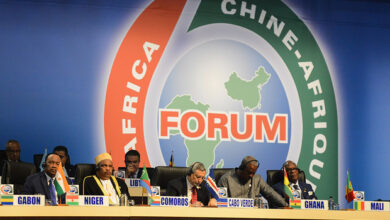
Egyptian-African relations
By : Eman Altahan
17-6–2024
Egyptian-African relations are historical relations that date back long periods of time, as Egypt has played an important role in Africa since ancient times. We will divide the article into several time periods leading up to the term of President Abdel Fattah al-Sisi.
- Egyptian-African Relations in Antiquity
In Pharaonic times, Egypt was in close contact with neighboring African countries, exchanging commercial and cultural goods. For example, commercial voyages took place between Egypt and Puntland (present-day Somalia) to bring incense, gold, and materials.
Pharaonic texts recorded several trips to Punt, the most famous of which was that of Queen Hatshepsut in the fifteenth century BC. In the temple of Deir el-Bahari in Karnak, there are inscriptions depicting this journey, showing Egyptian ships loaded with valuable goods brought from Punt.
Relations with Nubia
To the south of Egypt, the Nubia region was under the influence of the civilization of ancient Egypt. Relations with Nuba were multifaceted, involving trade, political alliances, and sometimes military conflicts. Nubia was rich in natural resources such as gold, timber, and precious stones, making it an important trading partner for Egypt. In addition, Nubia was heavily influenced by Egyptian culture, embracing aspects of Egyptian art, language, and religion.
Cultural exchange and mutual influences
Egyptian-African relations in ancient times were not limited to trade, but also included cultural and religious exchange. The ancient Egyptians believed that some of their gods such as Amun and Isis had African origins, reflecting the cultural and religious overlap between Egypt and its African neighbors. Pharaonic inscriptions and statues also show clear African influences in art and architecture.
The strategic importance of relationships
Relations with neighboring African countries were of strategic importance to ancient Egypt. These ties helped secure Egypt’s southern border, ensure the flow of necessary resources, and strengthen Egyptian influence in the region. It also contributed to strengthening Egypt’s economic and military power, enabling it to maintain its position as one of the greatest civilizations of the ancient world. - Relations during the medieval period
With the introduction of Islam to Egypt in the seventh century CE, ties between Egypt and African countries increased, especially in North and East Africa. Egypt has become a major center of Islamic culture and education, contributing to the strengthening of religious and cultural relations with neighboring African countries.
Cultural and Religious Center
During the Middle Ages, Egypt became a major center of Islamic culture and education. Cairo, founded in 969 CE as the capital of the Fatimid state, became a center of science and religion, with Al-Azhar University founded in 970 CE, one of the oldest universities in the Islamic world. Al-Azhar played an important role in the dissemination of Islamic and religious sciences, attracting students from across Africa.
Business Links
Trade relations between Egypt and African countries increased during the Middle Ages. Egypt had a strategic geographical location linking Africa, Asia and Europe, making it an important trading center. Trade with countries such as Sudan, Ethiopia, the Maghreb, and East Africa was booming, with trade caravans carrying goods such as gold, ivory, timber, spices, and slaves.
Political Relations and Alliances
During the Middle Ages, there were political alliances between Egypt and neighboring African countries. The Fatimid state, the Ayyubids, and the Mamluks all sought to consolidate their influence in the region through alliances and political marriages. These ties have helped secure Egypt’s borders and promote stability in the region.
Hajj and religious exchange
The pilgrimage to Mecca was also an important factor in strengthening ties between Egypt and African countries. Pilgrims from across Africa passed through Egypt on their way to the Two Holy Mosques. This religious exchange contributed to strengthening cultural and religious relations between Egypt and African countries.
and the dissemination of Islamic teachings.
Relations with Nubia and Sudan
Relations with Nubia and Sudan were particularly important during this period. There was a constant exchange of population and cultures between Egypt and Nubia, as the Nile facilitated movement and communication. Egypt benefited from Sudan’s natural resources, especially gold, which was an important source of Egyptian wealth.
- Modern times and colonial period
In the nineteenth century and the beginning of the twentieth century,.
The period of Muhammad Ali Pasha
In the nineteenth century, Muhammad Ali Pasha took over Egypt and began implementing a comprehensive program to modernize the country and expand its influence in the region. Mohamed Ali recognized the importance of Sudan as part of a strategy to expand its influence and secure natural resources. In 1820, Muhammad Ali sent a military expedition to Sudan led by his son Ismail Pasha. The campaign succeeded in bringing large parts of Sudan under Egyptian rule.
Expanding Egyptian influence
Under Muhammad Ali Pasha and his successors, Egypt sought to expand its influence in Africa through military campaigns and trade. Muhammad Ali established an administrative system in Sudan and exploited natural resources such as gold and ivory. It also encouraged trade between Egypt, Sudan and other parts of the African continent, strengthening economic and political ties between Egypt and African countries.
Khedive Ismail period
During the reign of Khedive Ismail (1863–1879), Egypt continued to consolidate its influence in Africa. Ismail had ambitions to modernize Egypt and expand its geographical scope to include the southern regions of the African continent. Ismail tried to expand into the Great Lakes region and took advantage of the presence of natural resources such as gold and precious metals. This expansion has strengthened ties between Egypt and neighboring African countries.
European colonial period
At the end of the nineteenth century and the beginning of the twentieth century, most of the African continent was subjected to European colonization. Egypt itself came under British occupation in 1882. Despite this, Egypt continued to maintain ties with Sudan and some other African regions. The colonial period saw competition between European colonial powers for control of African lands, which affected relations between African states and Egypt.
Political and economic ties
Egyptian-African relations during the European colonial period were pivotal in strengthening political and economic ties. Egypt under Muhammad Ali and his successors benefited from Africa’s natural resources and supported trade expansion. This expansion strengthened Egypt’s position as a regional power and contributed to building a network of relations with neighboring African countries. - Post-independence period
After Egypt’s independence in 1952, under the leadership of Gamal Abdel Nasser, Egypt increased its support for African liberation movements. Egypt played a major role in supporting independence and liberation in African countries from European colonialism, which earned it a prominent position on the African continent.
Egyptian-African Relations in the Post-Independence Period
The reign of Gamal Abdel Nasser
After the revolution of July 23, 1952, Gamal Abdel Nasser assumed the leadership of Egypt and sought to strengthen its regional and international role. A key aspect of Nasser’s foreign policy was support for liberation movements in African countries seeking independence from European colonialism. Nasser saw support for these movements as an opportunity to strengthen African solidarity and Egypt’s place on the continent.
Supporting African liberation movements
Egypt under Nasser’s leadership provided political, military, and financial support to African liberation movements. Egypt hosted many militant African leaders and gave them the opportunity to organize and train their followers. Among the most prominent movements supported by Egypt were the National Liberation Movement in Algeria, the South African Liberation Movement, and the Zimbabwe Independence Movement.
Establishment of the Organization of African Unity
In 1963, Nasser co-founded the Organization of African Unity (OAU) alongside other African leaders such as Kwame Nkrumah of Ghana and Julius Nyerere of Tanzania. The OAU aimed to strengthen cooperation among African states, support liberation movements and unite efforts to achieve development and independence. Egypt has played a key role in the organization’s activities and hosted many of its meetings and events.
Economic and cultural relations
Nasser worked to strengthen economic relations with African countries by signing trade agreements and providing economic and technical assistance. Egypt has also sought to strengthen cultural and educational ties by providing scholarships for African students to study in Egyptian universities, and building cultural and educational centers across Africa.
Political and diplomatic impact
Egypt’s support for African liberation movements has earned it great respect and appreciation on the African continent. This support has contributed to strengthening Egypt’s political influence on the continent and making it a key player in African and international affairs. He also helped build strong alliances with several African countries that later became strategic partners of Egypt.
Post-Nasser period
After Nasser’s death in 1970, Egypt continued to maintain strong ties with African countries under the leadership of his successors, especially Anwar Sadat and Hosni Mubarak. Despite political and economic changes in Egypt, African relations have remained an essential part of Egyptian foreign policy. - President Abdel Fattah al-Sisi’s term
Since President Abdel Fattah al-Sisi came to power in 2014, Egyptian-African relations have developed significantly. Sisi has adopted a foreign policy aimed at strengthening ties with African countries at all political, economic, and cultural levels.
Since President Abdel Fattah al-Sisi came to power in 2014, Egyptian-African relations have witnessed a positive transformation and remarkable development. Sisi recognized the importance of the African continent as a strategic partner and focused his efforts on strengthening cooperation with African countries at all levels: political, economic, and cultural.
African Foreign Policy
President El-Sisi adopted an active foreign policy towards the African continent It consists in expanding the circle of cooperation and strengthening regional and continental partnerships. Sisi faced challenges that hindered previous cooperation such as colonialism and internal conflicts, and sought to promote stability and development on the continent.
Economy & Trade
Egypt has increased its trade exchanges with African countries, as economic relations have witnessed significant growth. The focus was on promoting joint investments and joint infrastructure projects with a number of African countries, which contributed to enhancing economic integration between Egypt and African countries.
Cultural and educational cooperation
Egypt has organized a number of initiatives to enhance cultural and educational cooperation with African countries, including scholarships for African students to study in Egyptian universities, exchange cultural and scientific visits, and enhance youth outreach.
Security & Defense
Egypt has contributed to enhancing security and stability in the African continent through security and defense cooperation in the fields of combating terrorism and enhancing the security capabilities of African countries, in order to enhance regional stability and combat common threats.
Egypt’s Role in Regional and Continental Organizations
Sisi’s tenure witnessed the strengthening of Egypt’s role in regional and continental organizations such as the African Union, where Egypt played a key role in issues of peace, security and development in the continent.
The importance of Egyptian-African relations - National security: Strengthening relations with African countries contributes to the stability of the region and the fight against terrorism and extremist groups.
- Economic development: Expanding economic cooperation with African countries provides great trade and investment opportunities for Egypt, especially in the fields of agriculture, energy and technology.
- International politics: Egypt’s increased influence on the African continent enhances Egypt’s position on the international stage and enables it to play a greater role in international organizations such as the African Union and the United Nations.
- Cultural and educational exchange: Strengthening cultural and educational ties with African countries helps to strengthen ties between peoples and promotes mutual understanding.
Conclusion
Egyptian-African relations are the cornerstone of Egypt’s foreign policy. Historically, Egypt has played an important role in supporting and developing African countries, and continues to strengthen these relations under the leadership of President Abdel Fattah al-Sisi. Increased cooperation with Africa enhances Egypt’s regional and international standing and promotes sustainable development and peace on the African continent.
As a key country in the Middle East and North Africa, Egypt under the leadership of President Abdel Fattah al-Sisi has succeeded in building strong and balanced relations with African countries, making it a strategic partner.




